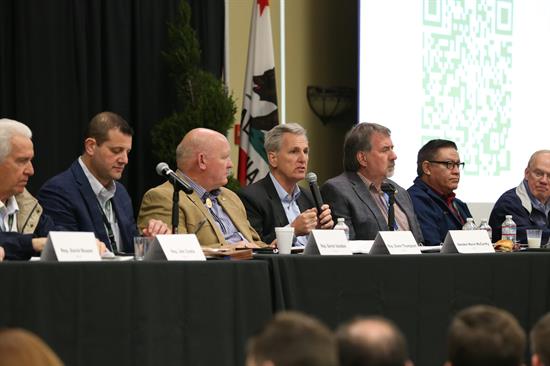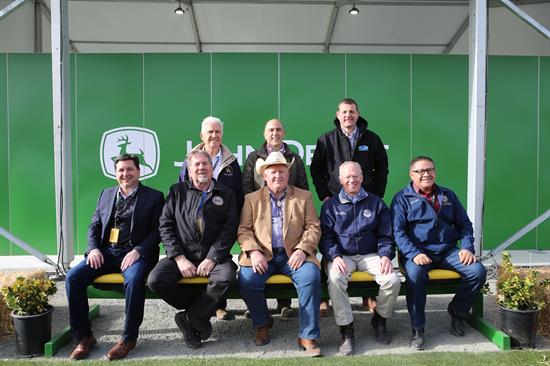In Case You Missed It
ICYMI: Highlights From The World Ag ExpoChairman Thompson hosts Speaker McCarthy, bipartisan group at Farm Bill panel
Washington,
February 17, 2023
On Tuesday, Glenn "GT" Thompson, Chairman of the House Committee on Agriculture, hosted the first official Farm Bill listening session in Tulare, California at the World Ag Expo.
"I remain committed to bringing the voices of rural America to the table as we deliberate the 2023 Farm Bill. Our first official bipartisan listening session at the World Ag Expo was a tremendous success, and I’d like to thank Speaker McCarthy, Rep. David Valadao, and all my colleagues for joining me to hear from those directly impacted by this critical legislation. The feedback we received will serve as a guide while crafting a Farm Bill that meets the needs of all farmers, ranchers, producers, foresters, and consumers nationwide," said Chairman Thompson. "The United States is one of the top agricultural producers in the world – a testament to our hardworking farmers. Addressing their needs is one of our main priorities this Congress. I am thankful for the leadership of Chairman Thompson, and look forward to working with him and my colleagues who attended the World Ag Expo to advance important legislation to help empower the Central Valley and America’s agricultural producers," said Speaker McCarthy. "My constituents are the farmers who feed the world, and their feedback is critical to making sure our Farm Bill reflects the needs of the Central Valley. This week, we heard a lot of valuable input about how to best support California agriculture in the upcoming Farm Bill – from strengthening crop insurance to addressing skyrocketing input costs. I want to thank Chairman Thompson for bringing the committee to Tulare, and Speaker McCarthy for continuing to put the Central Valley first. I look forward to working alongside members of the House Agriculture Committee on this vital legislation," said Rep. David Valadao. "The reauthorization of the Farm Bill is one of the most critical, bipartisan pieces of legislation we will work on this year. It is imperative that San Joaquin Valley and California farmers needs are heard and reflected in the final bill that goes to the President’s desk. Valley leaders showed up and set the stage for frank discussions about expanding high-demand, critical programs on trade, research, insurance, nutrition, technology, and equipment. The information gathered in this listening session will help us implement policies that address some of the Valley’s most pressing needs," said Rep. Jim Costa. "I appreciate Chairman Thompson leading our Committee to the World Ag Expo in my home state. As the top agriculture-producing state, it’s critical to give California farmers and ranchers this platform to voice concerns specific to our unique industry. I was proud to see such great turnout from all over our state, and so many of our 400+ commodities being represented," said Rep. Doug LaMalfa. “It was an honor to join Speaker McCarthy, Chairman Thompson, Congressman David Valadao, and other colleagues at the World Ag Expo to hear from industry stakeholders on how Congress can strengthen and improve farm programs in the 2023 Farm Bill. This listening session reinforced our commitment to delivering a Farm Bill that strongly reinforces the agrarian principles put forth by our founders. Doing so is critical for our economy and our farm families who work to ensure every American has access to the safest, most abundant food supply in the world. After all, food security is national security," said Rep. David Rouzer. "It was great getting to participate in the Farm Bill Listening Session at the World Ag Expo. Spending time with my colleagues – both Democrats and Republicans – is a good reminder that the Farm Bill is a bipartisan process. We all need to work together to find a path forward for this vital legislation that helps our farmers, ranchers, and farmworkers and maintains robust nutrition programs," said Rep. Salud Carbajal. "Members of Congress must continue to listen to our farmers, farmworkers, producers, ranchers, and others involved in our food security so that we can learn about the challenging issues and create sensible solutions to ensure that the United States continues to lead the world in agriculture production. That’s why it was invaluable to be on the ground in Tulare and attend this Farm Bill listening session. Moreover, it was an honor to attend the World Ag Expo with Speaker McCarthy, Chairman Thompson, my congressional colleagues, and the many other stakeholders as we work together to develop the foundation upon which to craft a Farm Bill for our nation’s agriculture," said Rep. Jimmy Panetta. "Farmers are working hard every day to put food on our tables and clothes on our backs. As we look to begin crafting the 2023 Farm Bill, the insights shared by direct beneficiaries and stakeholders of this critically important legislation are invaluable to policymakers. It is an honor listening to ag industry folks’ unique perspectives, and I am proud of our committee’s work helping them achieve their goals," said Rep. John Rose. "The Farm Bill listening session was a true success and a real insight into the massive task before us in making sure that farmers and agriculture communities are properly taken care of. Agriculture producers in the Central Valley of California are vital components of the State’s economy and Congress needs to prioritize their work to secure the future of farming. I look forward to working with my colleagues on the House Agriculture Committee in order to ensure our farmers are put first when drafting legislation this Congress," said Rep. John Duarte.
IN THE NEWS AgriTalk with Chip Flory: Chairman Thompson and Rep. David Valadao join Agri-Talk to discuss hot button issues like the Farm Bill and WOTUS. Listen here >>> By Chairman Glenn "GT" Thompson and Rep. David Valadao The last two years have been defined by uncertainty — a global pandemic, war in Ukraine, supply chain disruption, record inflation and skyrocketing costs from the gas pump to the grocery store. America’s agriculture sector was not spared from these challenges. In fact, despite these challenges, the nation’s farmers and ranchers continued to provide the safest, most abundant and affordable food and fiber supply to not only our nation, but also the globe. |


